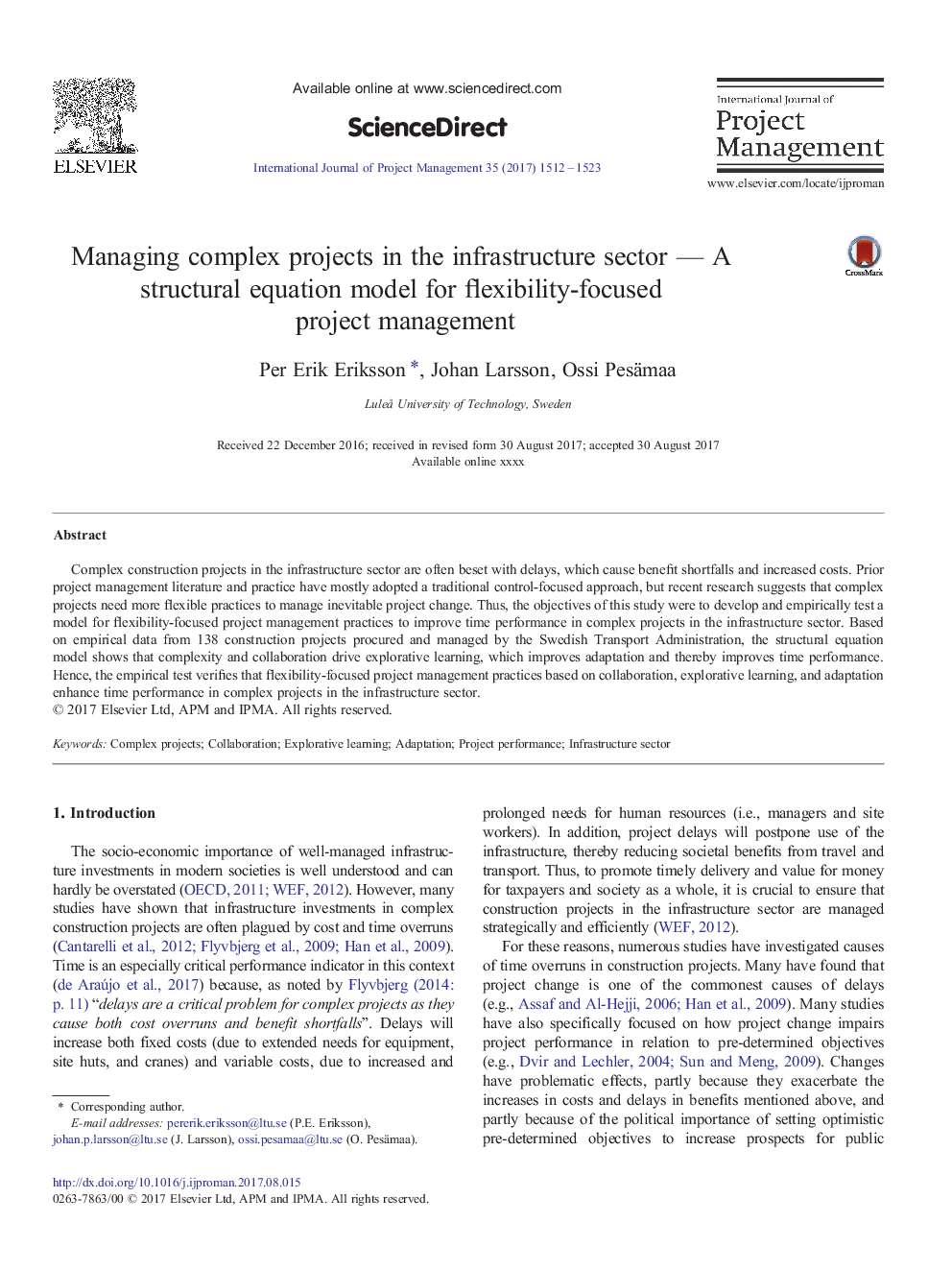| کد مقاله | کد نشریه | سال انتشار | مقاله انگلیسی | نسخه تمام متن |
|---|---|---|---|---|
| 4922060 | 1429652 | 2017 | 12 صفحه PDF | دانلود رایگان |
عنوان انگلیسی مقاله ISI
Managing complex projects in the infrastructure sector - A structural equation model for flexibility-focused project management
ترجمه فارسی عنوان
مدیریت پروژه های پیچیده در بخش زیربنایی - مدل معادلات ساختاری برای مدیریت پروژه با تمرکز انعطاف پذیر
دانلود مقاله + سفارش ترجمه
دانلود مقاله ISI انگلیسی
رایگان برای ایرانیان
کلمات کلیدی
پروژه های پیچیده همکاری، یادگیری اکتشافی، انطباق، عملکرد پروژه، زیرساخت بخش
ترجمه چکیده
پروژه های ساخت و ساز پیچیده در بخش زیربنایی اغلب با تاخیر مواجه می شوند، که باعث کمبود سود و افزایش هزینه ها می شود. ادبیات و مدیریت پیشین مدیریت پروژه عمدتا رویکرد متمرکز بر کنترل را پذیرفته است، اما تحقیقات اخیر نشان می دهد که پروژه های پیچیده نیاز به شیوه های انعطاف پذیر بیشتری برای مدیریت تغییر پروژه اجتناب ناپذیر دارند. بنابراین هدف از این مطالعه توسعه و آزمایش تجربی یک مدل برای شیوه های مدیریت پروژه متمرکز بر انعطاف پذیری برای بهبود عملکرد زمان در پروژه های پیچیده در بخش زیرساخت است. بر اساس داده های تجربی از 138 پروژه ساختمانی که توسط اداره حمل و نقل سوئدی توسط اداره حمل و نقل سوئدی تامین و اداره می شود، مدل معادلات ساختاری نشان می دهد که پیچیدگی و همکاری موجب یادگیری اکتشافی می شود که سازگاری را بهبود می بخشد و در نتیجه عملکرد زمان را بهبود می بخشد. از این رو، آزمون تجربی تأیید می کند که شیوه های مدیریت پروژه متمرکز بر انعطاف پذیری مبتنی بر همکاری، یادگیری اکتشافی و سازگاری، افزایش زمان کار پروژه های پیچیده در بخش زیربنایی است.
موضوعات مرتبط
مهندسی و علوم پایه
سایر رشته های مهندسی
مهندسی عمران و سازه
چکیده انگلیسی
Complex construction projects in the infrastructure sector are often beset with delays, which cause benefit shortfalls and increased costs. Prior project management literature and practice have mostly adopted a traditional control-focused approach, but recent research suggests that complex projects need more flexible practices to manage inevitable project change. Thus, the objectives of this study were to develop and empirically test a model for flexibility-focused project management practices to improve time performance in complex projects in the infrastructure sector. Based on empirical data from 138 construction projects procured and managed by the Swedish Transport Administration, the structural equation model shows that complexity and collaboration drive explorative learning, which improves adaptation and thereby improves time performance. Hence, the empirical test verifies that flexibility-focused project management practices based on collaboration, explorative learning, and adaptation enhance time performance in complex projects in the infrastructure sector.
ناشر
Database: Elsevier - ScienceDirect (ساینس دایرکت)
Journal: International Journal of Project Management - Volume 35, Issue 8, November 2017, Pages 1512-1523
Journal: International Journal of Project Management - Volume 35, Issue 8, November 2017, Pages 1512-1523
نویسندگان
Per Erik Eriksson, Johan Larsson, Ossi Pesämaa,
